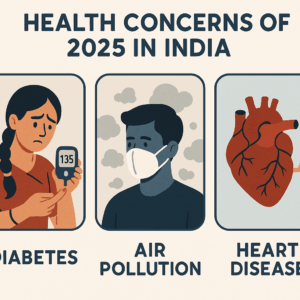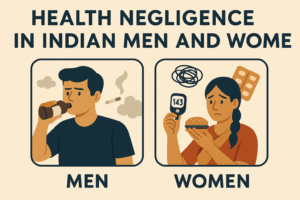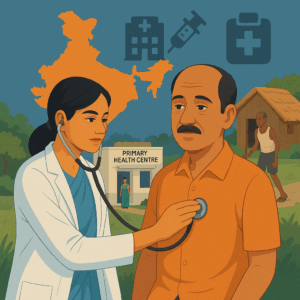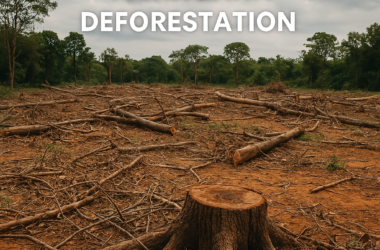India in 2025 stands at a critical health juncture with major Health concerns. Rapid urbanization and lifestyle changes have brought both progress and problems. While technology has improved diagnosis, diseases are emerging faster than ever. Changing diets, erratic sleep patterns, and high stress are silent killers. The youth are also reporting chronic issues earlier than expected. Sedentary lifestyles, especially post-COVID, have worsened health for many. Fast food, screen addiction, and lack of outdoor activity are now common. Mental health is also showing alarming trends across all age groups. Elderly care remains underdeveloped in many parts of India. Pollution continues to harm respiratory systems in both rural and urban zones.
The rural population struggles with access to basic healthcare services. Rising costs make quality health inaccessible to lower-income families. Women’s health, often ignored, is now gaining slow recognition. Men too ignore signs until conditions become serious. Awareness about preventive health is still missing in large pockets. India’s health infrastructure, while improving, is burdened beyond capacity. More public-private partnerships are needed for effective outreach. Community health workers need better training and resources. Health concerns of 2025 demand urgent and holistic solutions. Ignoring them now will only multiply long-term consequences for the nation.
Background of Indian Health Overall
India has seen massive growth in healthcare since independence. Still, inequality in health services remains vast. Urban areas enjoy better hospitals and facilities. Rural areas suffer from staff shortages and limited infrastructure. Primary health centers often lack essential equipment. Many Indians rely on unlicensed practitioners for quick relief. Over-the-counter medicine misuse is another rising issue. Ayurveda and homeopathy are still widely used, sometimes delaying diagnosis. Private hospitals dominate urban centers, often unaffordable for many. Government schemes like Ayushman Bharat are promising, but reach is inconsistent. Preventive health measures rarely receive public attention. Immunization coverage has improved but is not universal.

Malnutrition continues among children despite several programs. Hygiene and sanitation issues lead to preventable diseases. Mental health services are scarce and poorly distributed. Non-communicable diseases like diabetes and hypertension are increasing. Cancer detection is often late due to lack of screening. Health education in schools is limited and outdated. Addiction to tobacco, alcohol, and substances remains high. India’s health concerns go beyond physical issues. Emotional and environmental health need urgent attention. To tackle all of this, national planning must be both people-focused and data-driven.
Health Negligence in Indian Men and Women
Indian men often ignore minor symptoms until conditions worsen. They avoid regular checkups due to fear or time constraints. Social pressure makes them appear strong and ignore pain. Common problems include high blood pressure, diabetes, and heart disease. Stress and poor work-life balance harm their mental health. Fitness is often sidelined due to long working hours. Lifestyle choices such as smoking and alcohol worsen the situation. Indian women face a different but equally dangerous pattern. Many prioritize family over their own health needs.

Conditions like anemia, thyroid issues, and PCOS are widespread. Menstrual health is still taboo in many communities. Postpartum depression often goes unnoticed and untreated. Many women suffer silently from stress and exhaustion. Cervical and breast cancer screenings are still very limited. Nutrition for women, especially in rural India, is poor. Women are less likely to seek mental health support. Gender-based violence also contributes to emotional trauma. Neglecting mental health worsens physical conditions in both genders. Awareness among both men and women is urgently needed. Health concerns must be gender-sensitive and culturally inclusive. Only then can we expect lasting improvements in national health outcomes.
Awareness Needed Going Ahead
Preventive health checkups should become a household routine. Schools must educate children early about hygiene and fitness. Campaigns should promote mental wellness alongside physical fitness. Local languages must be used for maximum reach. Digital health literacy must be improved among all age groups. Wearable health tech can help track early warning signs. Fitness should be fun, not forced. Yoga, sports, and outdoor play need encouragement. Community health drives must include free basic screenings. Use of social media can help spread awareness fast.

Celebrities and influencers must talk about health openly. Workplaces must promote health programs for employees. Stress management sessions can reduce mental pressure. Healthy eating should be made affordable and accessible. Government should subsidize nutritious foods like fruits and vegetables. Rural health centers must be strengthened with skilled staff. Insurance policies must cover preventive health checkups too. Holistic healthcare models should include mental and emotional support. Awareness is the key to reversing national health decline. Health concerns can be tackled only with informed participation. 2025 is a wake-up call, not a dead end.
Conclusion: Enjoying Life with Good Health
Maintaining health is not just about treatment. It is about prevention, balance, and consistency. Daily movement can prevent several long-term diseases. Proper nutrition builds immunity and energy. Adequate sleep heals the mind and body. Regular checkups catch problems before they grow. Mental wellness helps in maintaining emotional stability. A healthy individual contributes more to society. Relationships also improve when stress is managed well.
Productivity rises when energy levels remain stable. Happiness increases when health is not a concern. With awareness and effort, health becomes a lifestyle. Avoiding illness saves money and pain. Investing in health is the best gift to yourself. 2025 can be the year of change for many. Let’s use this time to prioritize our wellness. The nation needs strong, aware, and fit citizens. Our families depend on us staying healthy. Community strength comes from individual well-being. Health concerns are real but manageable. Life is better when lived in good health. Let’s make health our top priority this year.
Utpal Khot
Copyright © Utpal K
1. If you share this post, please give due credit to the author Utpal Khot
2. Please DO NOT PLAGIARIZE. Please DO NOT Cut/Copy/Paste this post.
© Utpal K., all rights reserved.
Copyright Notice: No part of this Blog may be reproduced or utilized in any form or by any means, electronic or mechanical including photocopying or by any information storage and retrieval system, without permission in writing from the Blog Author Utpal Khot who holds the copyright.





